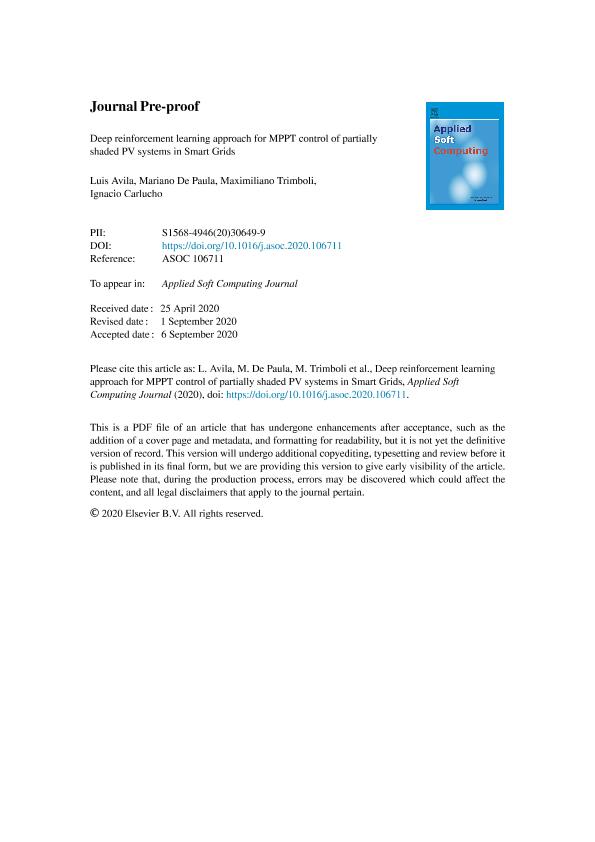Mostrar el registro sencillo del ítem
dc.contributor.author
Avila, Luis Omar

dc.contributor.author
de Paula, Mariano

dc.contributor.author
Trimboli, Maximiliano Daniel

dc.contributor.author
Carlucho, Ignacio

dc.date.available
2021-07-22T12:05:23Z
dc.date.issued
2020-12
dc.identifier.citation
Avila, Luis Omar; de Paula, Mariano; Trimboli, Maximiliano Daniel; Carlucho, Ignacio; Deep reinforcement learning approach for MPPT control of partially shaded PV systems in Smart Grids; Elsevier Science; Applied Soft Computing; 97; 12-2020; 1-39
dc.identifier.issn
1568-4946
dc.identifier.uri
http://hdl.handle.net/11336/136641
dc.description.abstract
Photovoltaic systems (PV) are having an increased importance in modern smart grids systems. Usually, in order to maximize the energy output of the PV arrays a maximum power point tracking (MPPT) algorithm is used. However, once deployed, weather conditions such as clouds can cause shades in the PV arrays affecting the dynamics of each panel differently. These conditions directly affect the available energy output of the arrays and in turn make the MPPT task extremely difficult. For these reasons, under partial shading conditions, it is necessary to have algorithms that are able to learn and adapt online to the changing state of the system. In this work we propose the use of deep reinforcement learning (DRL) techniques to address the MPPT problem of a PV array under partial shading conditions. We develop a model free RL algorithm to maximize the efficiency in MPPT control. The agent's policy is parameterized by neural networks, which take the sensory information as input and directly output the control signal. Furthermore, a PV environment under shading conditions was developed in the open source OpenAI Gym platform and is made available in an open repository. Several tests are performed, using the developed simulated environment, to test the robustness of the proposed control strategies to different climate conditions. The obtained results show the feasibility of our proposal with a successful performance with fast responses and stable behaviors. The best results for the presented methodology show that the maximum operating power point achieved has a deviation less than 1% compared to the theoretical maximum power point.
dc.format
application/pdf
dc.language.iso
eng
dc.publisher
Elsevier Science

dc.rights
info:eu-repo/semantics/openAccess
dc.rights.uri
https://creativecommons.org/licenses/by-nc-nd/2.5/ar/
dc.subject
DEEP RL
dc.subject
MPPT
dc.subject
OPENAI GYM
dc.subject
PV SYSTEMS
dc.subject.classification
Control Automático y Robótica

dc.subject.classification
Ingeniería Eléctrica, Ingeniería Electrónica e Ingeniería de la Información

dc.subject.classification
INGENIERÍAS Y TECNOLOGÍAS

dc.title
Deep reinforcement learning approach for MPPT control of partially shaded PV systems in Smart Grids
dc.type
info:eu-repo/semantics/article
dc.type
info:ar-repo/semantics/artículo
dc.type
info:eu-repo/semantics/publishedVersion
dc.date.updated
2020-12-22T15:45:11Z
dc.journal.volume
97
dc.journal.pagination
1-39
dc.journal.pais
Países Bajos

dc.journal.ciudad
Amsterdam
dc.description.fil
Fil: Avila, Luis Omar. Universidad Nacional de San Luis. Facultad de Ciencias Físico Matemáticas y Naturales. Departamento de Informática. Laboratorio Investigación y Desarrollo en Inteligencia Computacional; Argentina. Consejo Nacional de Investigaciones Científicas y Técnicas; Argentina
dc.description.fil
Fil: de Paula, Mariano. Universidad Nacional del Centro de la Provincia de Buenos Aires. Centro de Investigaciones en Física e Ingeniería del Centro de la Provincia de Buenos Aires. - Consejo Nacional de Investigaciones Científicas y Técnicas. Centro Científico Tecnológico Conicet - Tandil. Centro de Investigaciones en Física e Ingeniería del Centro de la Provincia de Buenos Aires. - Provincia de Buenos Aires. Gobernación. Comisión de Investigaciones Científicas. Centro de Investigaciones en Física e Ingeniería del Centro de la Provincia de Buenos Aires; Argentina
dc.description.fil
Fil: Trimboli, Maximiliano Daniel. Universidad Nacional de San Luis. Facultad de Ingeniería y Ciencias Agropecuarias. Laboratorio de Control Automático; Argentina. Consejo Nacional de Investigaciones Científicas y Técnicas; Argentina
dc.description.fil
Fil: Carlucho, Ignacio. State University of Louisiana; Estados Unidos. Consejo Nacional de Investigaciones Científicas y Técnicas; Argentina
dc.journal.title
Applied Soft Computing

dc.relation.alternativeid
info:eu-repo/semantics/altIdentifier/url/https://www.sciencedirect.com/science/article/abs/pii/S1568494620306499
dc.relation.alternativeid
info:eu-repo/semantics/altIdentifier/doi/http://dx.doi.org/10.1016/j.asoc.2020.106711
Archivos asociados
